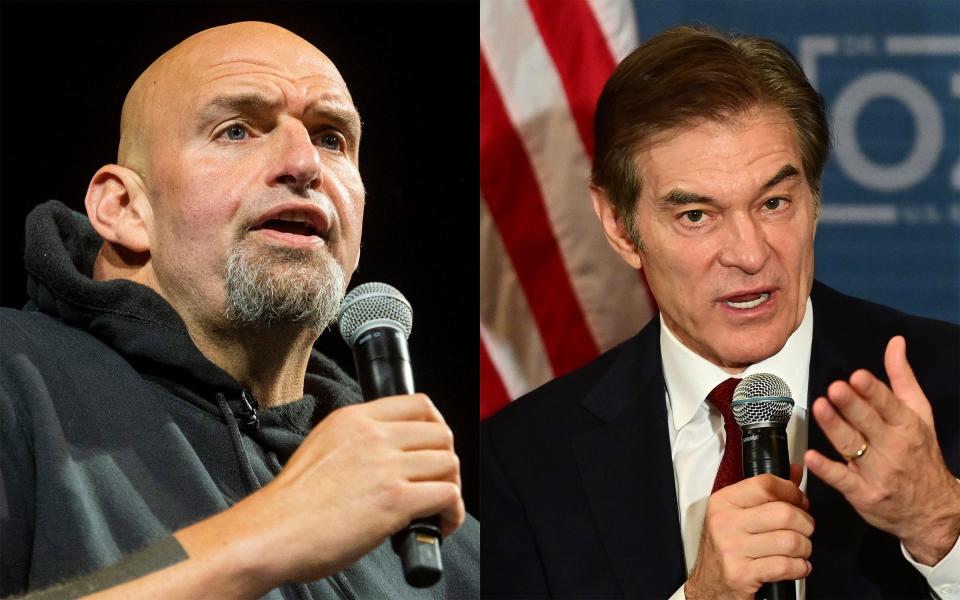Fact check: No correlation between winning candidates and number of social media followers
- Oops!Something went wrong.Please try again later.
- Oops!Something went wrong.Please try again later.
The claim: Candidates with more social media followers losing an election is proof of fraud
Before announcing their bids for public office, Pennsylvania Senate candidate Dr. Mehmet Oz and Arizona gubernatorial candidate Kari Lake had large social media followings – Oz from his TV show and Lake from her work as a local news anchor in Arizona.
In the days after the midterm election, some social media users claimed that those large online followers made it unlikely that Lake and Oz could lose their respective races.
"There is no way that this was legitimate, and no, we are not calling the AZ race yet," reads the caption of a Nov. 9 Instagram post, published before the Associated Press called the race for Democratic gubernatorial candidate Katie Hobbs.
The post, which received more than 400 likes in a week, includes two images. The first one shows screenshots of the number of Instagram followers Oz and his opponent Democratic candidate John Fetterman have. The second shows screenshots of the number of followers Lake and Hobbs have on Instagram.
Though Fetterman and Hobbs have fewer followers, both candidates won their elections, according to Associated Press calls. And experts told USA TODAY there is no relationship between having a larger number of social media followers and winning elections.
USA TODAY reached out to the social media user who shared the post for comment.
Follow us on Facebook! Like our page to get updates throughout the day on our latest debunks

All social media followers are not voters
There is no relationship between the number of followers a candidate has on any given social media platform and winning an election, said Jennifer Stromer-Galley, a professor at Syracuse University focused on social media and online interaction.
"Social media users do not correlate with the general public. It is a skewed sample, it is not the broader public," Stromer-Galley told USA TODAY. "That alone should make us skeptical that follower rates would have a relationship with voter turnout or winning elections.”
In fact, it's unlikely the large social media followings for Oz and Lake have anything to do with their respective elections, Stromer-Galley said. Their previous television careers led Lake and Oz to amass their large social media following, but it likely consists mostly of people outside their voting bloc, Stromer-Galley said.
Thomas Fujiwara, a professor at Princeton University who recently published a paper on the effects of social media on elections, said there is not a connection between social media followers and electoral outcomes,.
"All elections are local to some extent – social media is not,” Fujiwara told USA TODAY.
A Pew Research Center study from 2021 found 70% of Americans regularly use Facebook, 40% regularly use Instagram and less than 25% regularly use Twitter.
"Social media is not real life," Fujiwara said. "Most people are not on Instagram, most people do not follow politicians on Instagram."
Stromer-Galley also noted only a portion of social media users are registered to vote.
Fujiwara said this social media post is an example of correlation neglect.
“It’s a fancy way of saying people talk to their friends, their social media followers and they make this leap into thinking (their friends and social media followers) represent the overall population,” Fujiwara said. "We have a hard time recognizing our bias.”
Fact check:Viral image shows election worker, not Katie Hobbs, in secure voting area
Our rating: False
Based on our research, we rate FALSE the claim that candidates with more social media followers losing an election is proof of fraud. Experts told USA TODAY there is no correlation between the two. In this case, both candidates who lost had large social media followings before they started their political careers, meaning the followings consisted largely of people outside their voting bloc.
Our fact-check sources:
Jennifer Stromer-Galley, Nov. 14, Phone interview with USA TODAY
Thomas Fujiwara, Nov. 16. Phone interview with USA TODAY
Associated Press, Nov. 9, Democrat John Fetterman wins US Senate race in Pennsylvania
Associated Press, Nov. 14, Hobbs wins Arizona governor’s race, flipping state for Dems
Associated Press, Oct. 20, Dr. Oz made reputation as a surgeon, a fortune as a salesman
New York Times, Nov. 5, In Arizona, Kari Lake Worked in Local TV News. Now, She Calls Reporters ‘Monsters.’
Princeton University, Oct. 25, The Effect of Social Media on Elections: Evidence from the United States∗
Pew Research Center, June 1, 2021, 10 facts about Americans and Facebook
Thank you for supporting our journalism. You can subscribe to our print edition, ad-free app or electronic newspaper replica here.
Our fact-check work is supported in part by a grant from Facebook.
This article originally appeared on USA TODAY: Fact check: Social following not an indicator of election success

